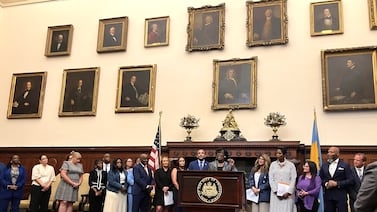Sign up for Chalkbeat New York’s free daily newsletter to keep up with NYC’s public schools.
In a surprise move, New York City public schools that enrolled fewer students than projected will not see their budgets slashed midyear, the city’s Education Department announced Wednesday.
School funding is typically allocated to schools during the summer based on the city’s projections of how many students are expected to fill their seats. That funding is then adjusted during the school year as a clearer enrollment picture emerges.
Now, though, the decision to hold all schools harmless from midyear cuts means that those with lower-than-projected enrollment will be spared from potentially painful choices about where to allocate their more limited resources.
Meanwhile, schools that enrolled a higher number of students than anticipated will still see their budgets adjusted and receive additional funding, city officials said.
Enrollment was lower than projected at about half of the city’s more than 1,600 schools and higher than anticipated in the other half, Education Department officials said. The schools with lower enrollment will no longer lose out on $157 million dollars that would have otherwise been clawed back. The schools with expanded rosters are expected to receive about $146 million in additional funds.
Principals learned of the news in a Wednesday email from schools Chancellor Melissa Aviles-Ramos, offering a breath of relief as schools finished class on the day before Thanksgiving break.
In a statement, Aviles-Ramos said ensuring school leaders had sufficient resources to support their students was her “top priority.”
“I am proud that in direct response to feedback from our school communities, schools will not only receive funding, but also personalized supports designed to help them make the most of this funding,” she said.
That support will range from one-on-one meetings to school budget reviews with budget directors from district offices, according to the Education Department.
The Wednesday announcement represents a return to a pandemic-era policy, when city officials were reluctant to cut budgets even as many schools lost students. Last year, schools faced midyear cuts for the first time in four years.
At the time, the policy change prompted some backlash from advocates, as schools continued to grapple with the lingering effects of the pandemic. But city officials argued the cuts were necessary amid the city’s bleaker financial picture and dwindling federal relief funds.
Though the city’s public schools saw overall enrollment remain steady this year, falling by just 0.1%, student populations still fluctuate from school to school.
And in recent years, the city has seen a growing number of small schools, as citywide enrollment has fallen by about 14%, or 130,000 students, since 2016. The number of schools with fewer than 200 students doubled in that same period, reaching 190 last year, according to a Chalkbeat analysis.
Julian Shen-Berro is a reporter covering New York City. Contact him at jshen-berro@chalkbeat.org.






